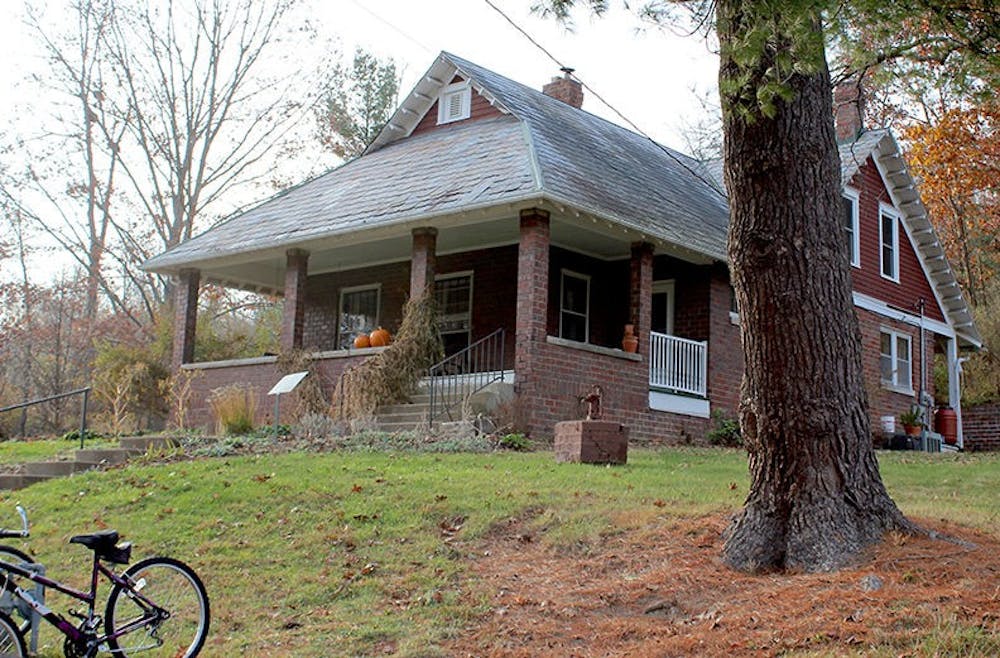OU’s Ecohouse offers three university students each year a chance to live in a sustainably-designed home.
An alternative, off-campus housing option, the Ohio University Ecohouse, still offers sustainable-minded students a living space devoted to conservation nearly a decade after it opened.
The university-owned house, located past The Ridges property at 8133 Dairy Ln., offers a 10-month lease through OU's Office of Sustainability for $425 a month per student, including utilities.
Each year, a combined total of three graduate and undergraduate students are selected through an online application process that begins early in fall semester.
“It’s cool being able to learn more about sustainability,” said Tiffany Stelzer, a junior studying marine, freshwater and environmental biology, and one of the current Ecohouse residents. “It’s cool to know that there are so many things to do on a regular day-to-day life that can help conserve the environment and be sustainable.”
Stelzer, Arden MacDonald, a junior studying linguistics, and Matthew Friend, a senior studying microbiology, are currently living in the Ecohouse.
"Living here does not require that I submit to ‘eco-standards’ or unconventional living,” MacDonald said. “It instead offers tools and resources and encourage introspection so that I may develop a way of life that suits my comfort and conscience.”
{{tncms-asset app="editorial" id="eadf49dc-78f6-11e4-80de-c7f47de75425"}}
What started as an idea in the summer of 2004 for a student center focused on sustainable lifestyles became a reality in June 2005 for the house’s first three residents, according to the Office of Sustainability’s website. More $60,000 in grant funding was used to support the Ecohouse program.
Since that time, the installation of a solar panel, a solar thermal heater and a rainwater collection system have all been successful tools to reduce the students’ individual impact on the environment. A website now calculates the house’s hour-by-hour utility rates in order for the students to accurately monitor their energy consumption, Stelzer said.
Water resources are especially critical to conservation, and the Ecohouse reuses as much of the collected rainwater as it can.
“We have the option to use (the rainwater) to fill up buckets and take them into the bathroom,” Stelzer said, “that way we can pour it into the toilet to flush it, to save water.”
The house’s adjacent organic garden is tended by a summer-staffed gardener who waters the plots with the recycled rainwater, as well.
In addition, rented plots from OU’s Ecohouse garden are available for any local vegetable-enthusiast who may wish to plant seeds in a community organic garden.
The Ecohouse is equipped with its own composting bin, located just outside the back entrance of the house’s kitchen area. Almost all of the residents’ food waste, aside from citrus-based products, can be deposited into the compost tank for reuse in the organic garden.
While the property’s solar panels convert solar energy into usable electricity, the solar thermal panels are used for another purpose –– heating the house’s water.
“The sunlight comes down and heats it up, and then that’s how we get our hot water,” Stelzer said.
“The legacy of the OHIO Ecohouse will constantly evolve as technologies and approaches toward sustainable living evolve,” Annie Laurie Cadmus, director of sustainability at the OU Office of Sustainability, said in an email. “We really hope the house will serve as an educational tool for many students and as a transformative experience for its residents.”
A willingness, not a degree or background, in sustainability is all that’s needed for lodging at the Ecohouse, according to the Office of Sustainability’s Ecohouse application –– a willingness to learn and live with the environment in mind.
@bnbjourno
bb308113@ohio.edu






